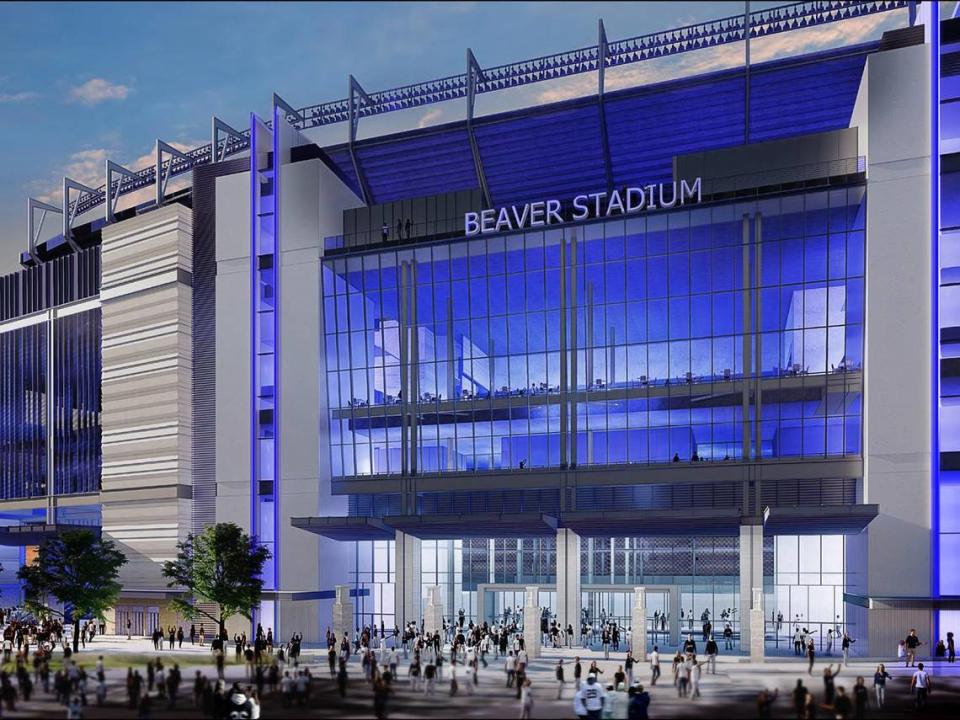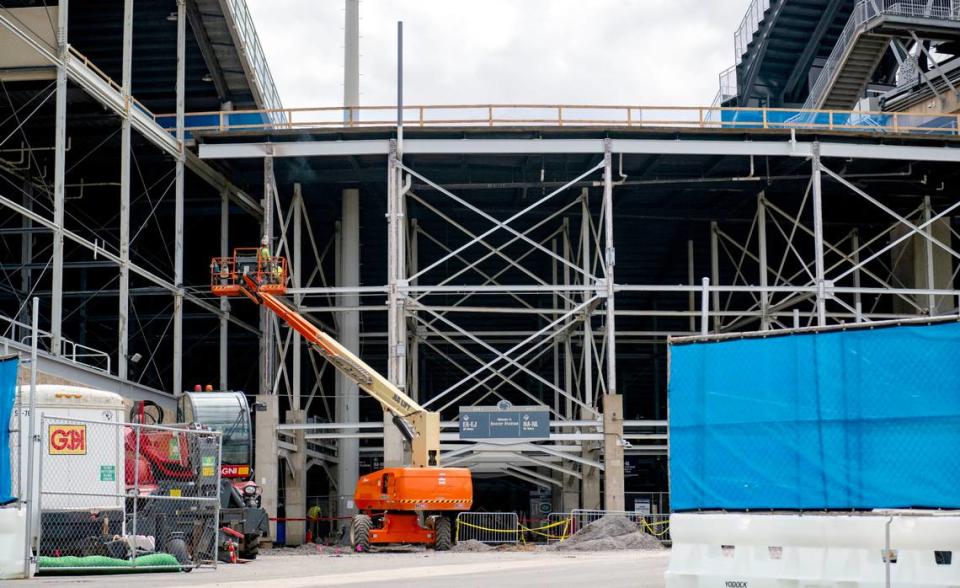Penn State trustees made a $700M decision on Beaver Stadium. Some question the process
The Penn State board of trustees approved spending up to $700 million in renovations at Beaver Stadium earlier this week, but not without some trustees questioning the timing of the meeting and the legality of past meetings on the monumental project.
In a 26-2 vote on Tuesday, the board approved the renovations, although what the design will look like is still largely unknown. Three trustees abstained from the vote.
Tuesday’s meeting was the first time the board publicly deliberated this part of the renovations (In May 2023, it approved moving forward with a $70 million renovation that included winterizing the stadium so it could host a College Football Playoff game in addition to stadium design costs, professional consultant expenses, acquisition of permits, etc.). The board and subcommittees have held a few executive sessions about the renovations, including one held immediately before Tuesday’s meeting.
During Tuesday’s public meeting, which was held on Zoom, some trustees said they felt rushed and questioned why they needed to vote on the project that day. A small group of trustees tried to pass a motion to postpone the meeting until July, but the vote overwhelmingly failed.
Trustee Alvin de Levie was among those wanting more time.
“The evidence was, ‘If we delay a year it’s going to cost us a lot of money.’ A delay to July 8 costs us no money, gives the trustees and the public an opportunity to have our truly robust opportunity to deliberate,” he said during the meeting.
De Levie and Trustees Ted Brown and Jay Paterno abstained from the vote. Paterno said he abstained because he was involved in trying to create a public-private partnership to help fund the project, which the university did not move forward with. Brown and de Levie did not say why they abstained.
Anthony Lubrano and Barry Fenchak were the votes of opposition.

Enough time to deliberate?
Another point of contention during the meeting was how much time trustees could spend asking questions and making statements. “Given the high level of interest” in the project, Matthew Schuyler, chair of the board of trustees, asked members to ask one question at a time and once everyone had the opportunity to ask one, they’d go to second and third questions. He asked that statements be kept to two minutes or less.
“I think you’re just putting a time constraint on any trustee on a $700 million opportunity or resolution,” de Levie said. “...I think (it’s) an inappropriate way to handle this.”
Schulyer said “this session is not meant to be point-counterpoint debating.”
The Sunshine Act does not address whether a chair can or should limit comments and questions from board members, according to Melissa Melewsky, Media Law Counsel for the Pennsylvania NewsMedia Association, of which the CDT is a member. Most boards follow Roberts Rules of Order or another similar set of rules, she said.
“If there is a policy in effect, it would have to be consistent with the Sunshine Act in that the law requires public deliberation of agency business,” Melewsky wrote in an email.
Project discussed in executive sessions
Schuyler said they’ve had time to deliberate during executive sessions, but Trustee Anthony Lubrano argued they couldn’t do that under the Sunshine Act. The board’s counsel, however, said that was an incorrect interpretation of the law.
Executive sessions are allowed under Pennsylavania’s Sunshine Act, which requires agencies to deliberate and take official action on agency business in an open and public meeting, among other things. But the Sunshine Act limits executive sessions to just seven reasons — to discuss personnel matters, to consider the purchase or lease of real property and to consult with an attorney about active or pending litigation, to give a few examples.
An executive session was held prior to Tuesday’s meeting “to review and discuss elements of the Beaver Stadium renovation that if conducted in public would lead to the disclosure of information or confidentiality protected by law,” Schuyler told the board.
Under the Sunshine Act, an allowable reason for executive sessions is “to review and discuss agency business which, if conducted in public, would violate a lawful privilege or lead to the disclosure of information or confidentiality protected by law...” but Melewsky said the general topic of stadium renovations doesn’t fall under any executive session exceptions.
“There might be parts of that discussion that could trigger an executive session, but the majority of the discussion, and perhaps all of it, should have been discussed at a public meeting,” Melewsky said. “Also, if there was an executive session, the law requires the board to publicly announce the reason justifying the public’s exclusion, with specificity. If the board announced that they held an executive session to discuss the renovation and didn’t provide any legal justification under the law, it’s a Sunshine Act problem.”
Boards can deliberate during executive sessions, Melewsky said, but only on the limited topics allowed under the law.
“Discussing stadium renovations is not an executive session topic. What aspect of the stadium renovations were the executive sessions held to discuss?” she said. “The executive sessions must be publicly announced, with specificity, so that the public understands why they were excluded and can file a legal challenge if necessary.”
In a phone interview, Lubrano said he supported renovations and improvements made at the stadium but had concerns, including the timing of it and if the university would generate the revenues it expected to, and worried the university’s projected expenses were unrealistic. He again pointed to the Sunshine Act, saying he believes in openness and transparency, and while some things need to be discussed privately, this did not.
“This is a topic that should have been deliberated, debated in public. The taxpayer has a right to understand what we’re thinking and why,” he said.
This isn’t the first time the board’s compliance with the Sunshine Act has been questioned. In December, Spotlight PA sued the board of trustees over alleged violations of the state’s open meetings law.


